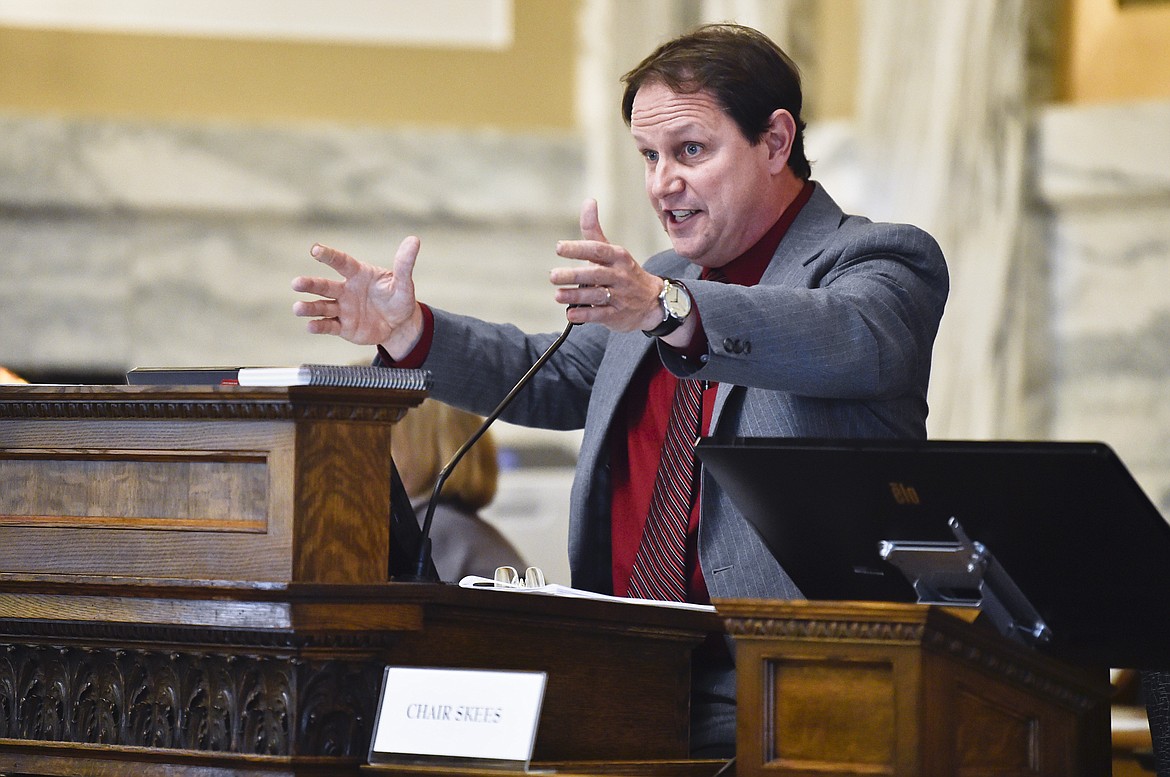Skees revives bill to eliminate Montana's political cop
CHAD SOKOL | Hagadone News Network | UPDATED 4 years, 11 months AGO
A Kalispell lawmaker has revived a proposal to eliminate the position of Montana's commissioner of political practices, an independent watchdog tasked with enforcing campaign finance, ethics, lobbying and voting laws.
Republican Rep. Derek Skees — who was named but never charged in a high-profile campaign finance case launched by the former commissioner of political practices in 2016 — argues the enforcement process is vulnerable to partisan influence. Opponents say his bill would eliminate a system that works well and jam up efforts to enforce corruption among public officials and candidates.
The Montana Legislature established the commissioner of political practices in 1975 in the aftermath of the Watergate scandal that shined a spotlight on harmful campaign activities.
Skees' House Bill 535, a modified version of legislation that passed the House before stalling in the Senate in 2017, would eliminate the commissioner's position and move the office's staff and investigative functions under the direction of the Montana secretary of state.
The bill also would create a panel of four legislators — two Democrats and two Republicans — who would review findings and decide whether to press cases further, which would involve legal action by either the county attorneys or the state attorney general.
"This is kind of a filter mechanism to slow down complaints that are partisan in nature," Skees told colleagues during a House committee hearing Thursday.
ONLY SKEES spoke in support of the bill. The current commissioner of political practices, Jeff Mangan, members of his staff and several former legislators spoke in opposition, along with representatives of Common Cause, Western Native Voice, the Montana Public Interest Research Group and the Montana Association of Clerks, Recorders and Election Administrators.
Several opponents said the bipartisan panel that Skees proposed sounds too much like the Federal Election Commission, which is widely regarded as slow and ineffective, in part because it often lacks enough appointed members to constitute a quorum.
Even when all those seats are filled, "partisan gridlock occurs because the votes die on a tie vote, time after time," said Jaime MacNaughton, general counsel for the commissioner of political practices office. "This results in the failure of the board to be able to provide guidance to candidates, parties and others who are seeking to understand their own legal obligations; the failure to update regulations to reflect changes in the law; and the failure to investigate and resolve serious, or even frivolous, campaign finance, ethics or lobbying changes."
Warning his colleagues about "a dramatic polarization of our culture," "a hyper-partisan takeover of our political process" and "the weaponization of government agencies at all levels," Skees said it's important to place investigations under the authority of the elected secretary of state, who is accountable to voters. The commissioner of political practices, Skees said, is not truly independent because he is appointed by and "answerable only to" the governor.
Mangan, the current commissioner, noted it's not that simple. State law spells out a process in which the Legislature recommends commissioner nominees to the governor, the governor makes a selection and that person is confirmed by the Senate. The commissioner can serve only one six-year term.
"The commissioner is nominated through a process by the Legislature — by you," Mangan told the committee. "I note that the good, honorable representative left that part out," he said, in a pointed remark referring to Skees.
Other opponents argued the secretary of state could be equally if not more partisan, and said Montana's current system is a model for other states.
WHILE SKEES has commended Mangan's job performance, he has castigated Mangan's predecessor, Jonathan Motl, who in 2016 pursued charges against Art Wittich, a former Bozeman legislator who headed a political committee called Western Tradition Partnership, which had made unreported in-kind contributions to Republican primary candidates across the state.
Skees' name turned up in documents belonging to the committee, showing he had received illicit contributions, but he denied that and was not charged because the statute of limitations had run out.
Some Republican lawmakers spoke critically of Skees and his effort to eliminate the commissioner of political practices when he first introduced the legislation in 2017.
"Somebody’s got their hand in the cookie jar and got slapped. This is a personal vendetta," Rep. Geraldine Custer, R-Forsyth, said at the time.
On Thursday, Skees described the commissioner of political practices as a "flawed system" that works only when the right person is filling the role.
"Sometimes it works. In the case we have currently, I think it's a phenomenal success," Skees said. "And [under] his predecessor, I think it was a phenomenal failure."
Reporter Chad Sokol can be reached at 758-4434 or [email protected]
ARTICLES BY CHAD SOKOL
Forest Service approves large project near Tally Lake
Forest Service approves large project near Tally Lake

State seeking public input after purchase of Somers Beach
The Montana Department of Fish, Wildlife and Parks said Thursday it has completed the purchase of a 106-acre swath of land on the north shore of Flathead Lake.

County approves bid for new animal shelter building
The Flathead County commissioners on Tuesday awarded a $446,900 contract for the construction of a new multipurpose building at the county's animal shelter.

